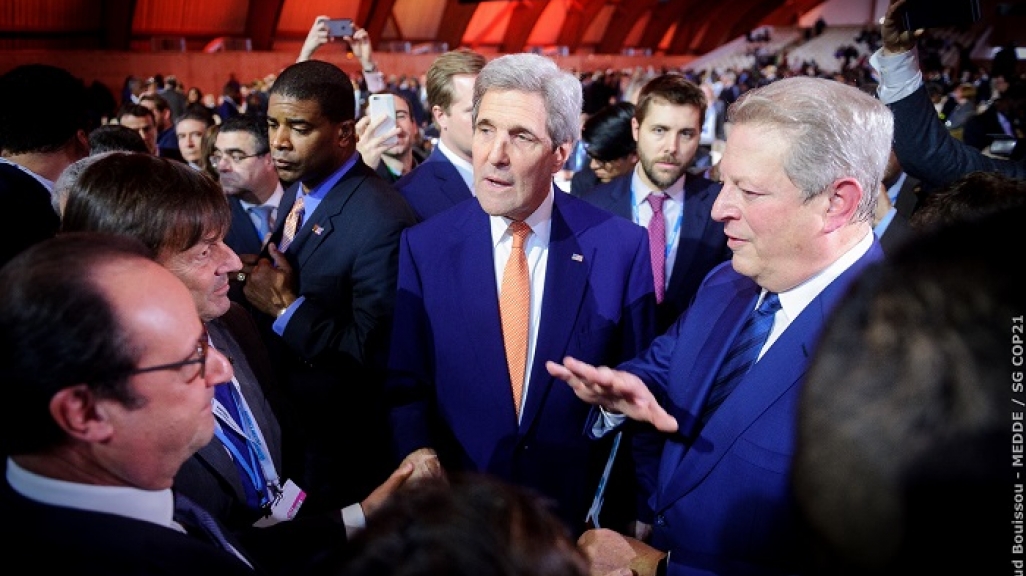Paris Update: North America's Role in COP21 Climate Negotiations
Paris Update: North America's Role in COP21 Climate Negotiations
Canada, Mexico, and the United States served as key players in the negotiations, making important policy moves and concessions.
After nearly two weeks of negotiations, 195 countries ratified the final text of the Paris Agreement, released on December 12. The deal’s main objective is for the rise in global temperatures to stay “well below” 2 degrees Celsius above preindustrial levels, with an aim of no more than 1.5 degrees.
The debate between developed and developing countries as to who would shoulder the costs of climate change reform stood as a major issue. The question was whether developed countries, which industrialized freely over the past two centuries, could be made to compensate developing countries. The agreement allows for developed countries to play a significant role in mitigating carbon emissions but, for the first time, emerging economies such as China and India were also called upon to curb emissions.
|
|
The Western Hemisphere, which includes several major economies that must curb carbon emissions to reach the desired goal, will be critical to the accord’s implementation. All three North American countries served as key players in the negotiations, making important policy moves and concessions.
Canada is the world’s ninth-most carbon-emitting country, but new Prime Minister Justin Trudeau is taking a firmer approach to climate issues than his predecessor, Stephen Harper. Trudeau promised in his speech to the UN climate gathering that climate change is a “top priority” for Ottawa.
Canadian First Nations leaders have shown strong approval for the country’s efforts to include indigenous rights in the climate treaty process, a move opposed by the European Union and United States over fears of liability for climate damages. Several activists representing indigenous peoples (from the Arctic to the Amazon) launched a flotilla of kayaks in downtown Paris on December 6 in a demonstration against fossil-fuel abuse and its impact on indigenous rights.
In February, Mexico became the first developing country to submit its climate action plan. It committed to reducing overall greenhouse gas emissions by 25 percent by 2030, though it is willing to increase this to 40 percent with help from other countries. Mexico further plans to establish a minimum rate of renewable energy production—25 percent of its power generation by 2018 and 60 percent by 2050.
The Mexican government also said it will invest $23 billion at refineries to slash greenhouse gas emissions from gasoline by 90 percent. President Enrique Peña Nieto’s administration announced a $3.1 billion project to reduce sulfur content in gasoline, to be carried out at six refineries in early 2016. Another $3 billion will be spent at three refineries and a gas processing plant so that they can produce their own electricity, cutting 3,000 tons of greenhouse gases per megawatts generated each year, starting in 2018. The government plans to spend $13 billion to increase capacity to process crude and another $3.9 billion to reduce need for imports of diesel with low sulfur content.
The United States, represented by U.S. Secretary of State John Kerry, embraced a leadership role in the negotiations, in contrast to the defensive position taken in Copenhagen in 2009. The United States will double financing for adaptation to global warning from about $400 million a year to $800 million by 2020. The United States resisted the inclusion of the word “compensation” and also insisted that the word “shall” be softened to “should” in Article 4, which allows for the carbon reductions to not be legally binding.
The countries of North America played a key role in the Paris negotiations, and implementation will be crucial. It is unclear whether the Paris Agreement constitutes a treaty, in which case the U.S. Congress would have to vote on the agreement. However, Kerry said that the agreement did not contain enforcement provisions, and thus will not require approval.










